Module 1Travel课件(共35张PPT)2024-2025学年英语外研版九年级下册
文档属性
| 名称 | Module 1Travel课件(共35张PPT)2024-2025学年英语外研版九年级下册 | 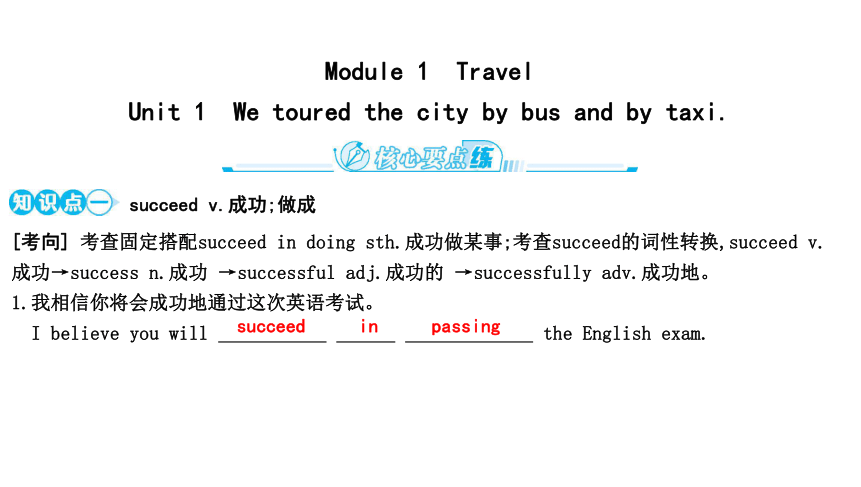 | |
| 格式 | pptx | ||
| 文件大小 | 394.5KB | ||
| 资源类型 | 教案 | ||
| 版本资源 | 外研版 | ||
| 科目 | 英语 | ||
| 更新时间 | 2024-07-05 23:45:52 | ||
图片预览

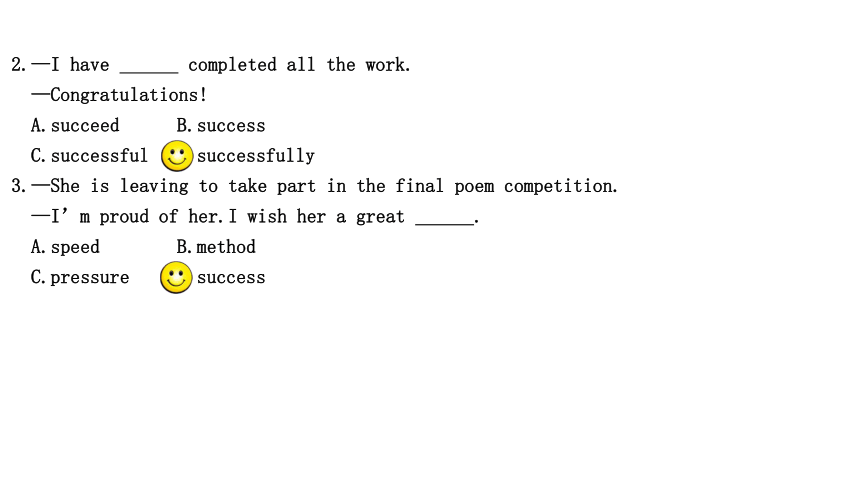



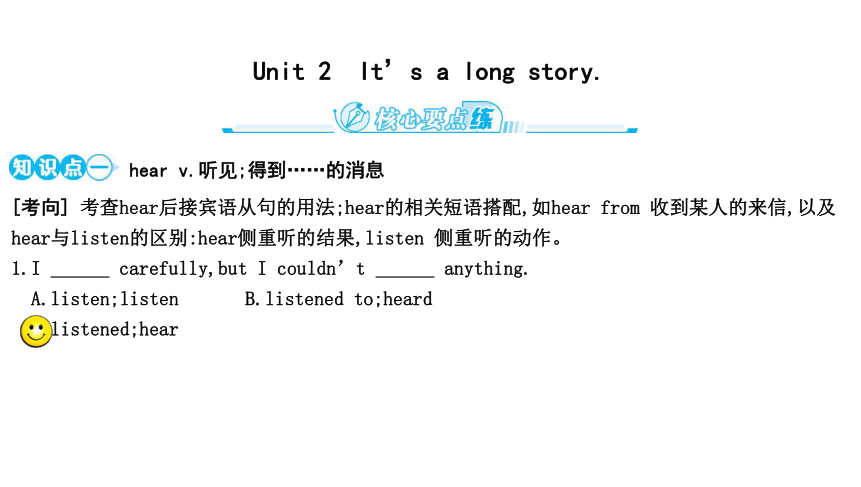
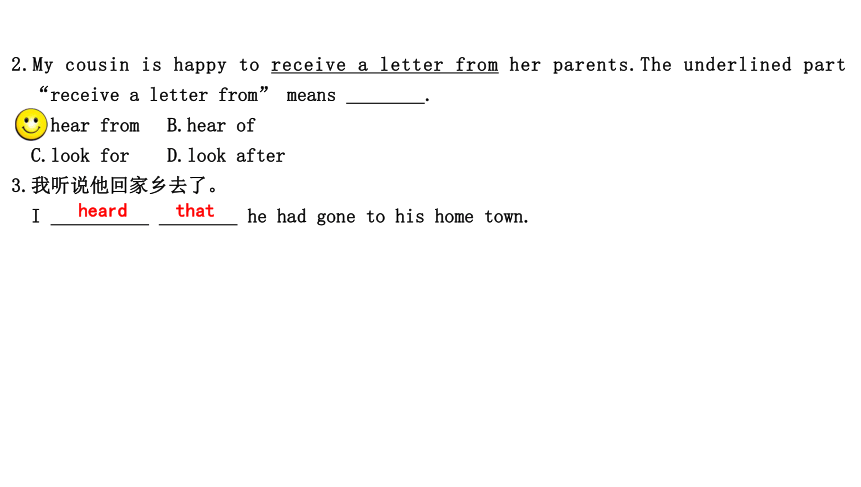




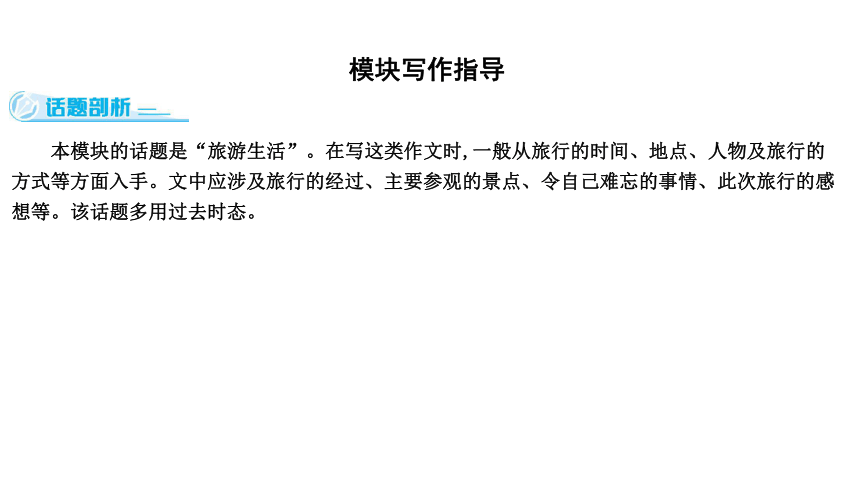
文档简介
(共35张PPT)
Module 1 Travel
Unit 1 We toured the city by bus and by taxi.
succeed v.成功;做成
[考向] 考查固定搭配succeed in doing sth.成功做某事;考查succeed的词性转换,succeed v.成功→success n.成功 →successful adj.成功的 →successfully adv.成功地。
1.我相信你将会成功地通过这次英语考试。
I believe you will the English exam.
succeed
in
passing
2.—I have completed all the work.
—Congratulations!
A.succeed B.success
C.successful D.successfully
3.—She is leaving to take part in the final poem competition.
—I’m proud of her.I wish her a great .
A.speed B.method
C.pressure D.success
辨析because of与because
[考向] because of 与because 都意为“因为,由于”。because of后接名词、代词、动名词;
because 为连词,其后通常接句子。
1.—Did you call Michael back
—I didn’t need to, I’ll see him tomorrow.
A.unless B.because
C.when D.though
2. (由于) the COVID-19,only a few markets were open.
Because of
as long as只要;与……一样长
[考向] as long as 可以用来表示条件,意为“只要”,引导条件状语从句时,要遵循“主将从现”原则;此短语还可以用来表示“和……一样长”。
1.这条线的长度是那条线的5倍。
This line is five times that one.
2.We will make fewer mistakes we are careful enough.
A.as long as B.so that
C.as far as D.even if
as
long
as
had better do sth.最好做某事
1.今天早晨我们吃光了所有的蔬菜,所以我们最好去超市买一些。
We ate up all the vegetables this morning,so we buy some in the
supermarket.
2.We’d better eight bottles of water every day.It’s good for our health.
A.to drink B.drinking
C.drank D.drink
had
better
Unit 2 It’s a long story.
hear v.听见;得到……的消息
[考向] 考查hear后接宾语从句的用法;hear的相关短语搭配,如hear from 收到某人的来信,以及hear与listen的区别:hear侧重听的结果,listen 侧重听的动作。
1.I carefully,but I couldn’t anything.
A.listen;listen B.listened to;heard
C.listened;hear
2.My cousin is happy to receive a letter from her parents.The underlined part
“receive a letter from” means .
A.hear from B.hear of
C.look for D.look after
3.我听说他回家乡去了。
I he had gone to his home town.
heard
that
surprise v.使惊奇n.令人惊奇的事(或消息等)
[考向] 考查其词性转换。surprise v./n.→surprised adj.感到惊讶的;surprising 令人惊讶的。surprised的主语一般是人,宾语是物,表示某人对某事物感到惊讶;surprising则相反,主语一般是物,宾语是人,表示某事物对于某人来说是一件令人惊讶的事。
1.What a to see you here!
A.surprised B.surprising
C.surprise
2.Simon was (surprise) to see spaceships from China.
3.She told me a (surprise) thing.
4.To our (surprised),he won the running race!He used to be a slow runner.
(2021绥化)
surprised
surprising
surprise
辨析elderly,elder与older
[考向] elder表示“前辈的;年纪较长的”,仅用于同一家庭成员的比较,主语只能是人;older则不限于此,具有“年长的,较旧的”等意思,主语可以是人,也可以是物;elderly是形容词,意为“年老的”。
1.The hotel is very old.It’s one of buildings in the city.
A.old B.older
C.oldest D.the oldest
2.用older或elder填空
My brother is three years than me.
3.His mother’s sister is an woman now.
A.older;older B.elder;elder
C.elder;elderly
elder
older
take care多保重;注意,当心,小心
[考向] take care多保重,当心,可单独使用;take care of 后接名词,表示“照顾”。
1.多保重!你一到家就给我打电话。
!Call me as soon as you get home.
2.当心!危险!
!It’s dangerous!
3.当你带你的宠物狗出去散步的时候,要照顾好它。
your pet dog when you take it out for a walk.
Take
care
Take
care
Take
care
of
take off脱去;起飞
1.You should your shoes before you enter the dancing room.(2021贺州)
A.get off B.put off
C.take off D.fall off
2.请脱下你的外套。这儿太热了。
Please your coat.It’s so hot here.
take
off
模块写作指导
本模块的话题是“旅游生活”。在写这类作文时,一般从旅行的时间、地点、人物及旅行的方式等方面入手。文中应涉及旅行的经过、主要参观的景点、令自己难忘的事情、此次旅行的感想等。该话题多用过去时态。
常用句型
1.我将带你领略一些四川的风景名胜。
I’ll show you around some places of interest in Sichuan.
2.在这里你会找到几乎各种交通方式。
You can find almost every kind of transport here.
3.我给妈妈买了一些特别的东西作为礼物。
I bought something special for my mom as presents.
4.由于天气很糟,我们没能拍到很好的照片。
We couldn’t take any good photos because of the bad weather.
5.虽然我有点累,但是我们玩得很开心。
We had a great/good/wonderful time though I was a little tired.
1.写作要求
根据提示,写一篇80词左右的英语短文。
(1)去年夏天我和父母一起去了青岛度假。我们是坐高铁去的。(vacation;take the high-
speed railway)
(2)那一天很美好。天气晴朗又凉爽。(sunny;cool)
(3)我们在海边做游戏,坐船到海里。我还学会了游泳。(on the beach;by boat;learn
swimming)
(4)我们吃了海鲜,味道很鲜美。(seafood;delicious)
(5)爸爸给我们拍了很多照片。我们度过了愉快的时光。(quite a few;take photos;have a
wonderful time)
2.思路点拨
(1)体裁:记叙文
(2)人称:第一人称
(3)时态:一般过去时
(4)写作导图:
3.范文借鉴
Last summer,I went to Qingdao for vacation with my parents.We took the high-speed railway to get there.It was a beautiful day and the weather was sunny and cool.We went to the beach.We played games on the beach.We went to the sea by boat and I learnt swimming in the sea.We had seafood and it tasted really delicious.My father took quite a few photos for us.We had a wonderful time there.
模块语法突破
1.The train was full of people,and I had to stand for over three hours!
2.We had quite a good time in Beijing.
3.We’re going to have a big exam at the end of the term.
4.You’ve taken the wrong seat.
5.This is Seat 12A,but you should be in Car 9.
6.I’ll take your seat in Car 9.
名 词
一、名词的分类
类别 意义 举例
专有名词 表示具体的人名、地名、事物、机构、组织等有名称的名词 Tom,New York,
the Summer Palace,
China
普 通 名 词 可 数 名 词 个体 名词 表示单个的人或事物的名词 desk,boy,girl,room,house
集合 名词 表示一群人或一些事物的总称的名词 people,police
不可数名词 物质名词 表示无法分为个体的物质的名词 water,rice,money,milk
抽象名词 表示抽象概念的名词 courage,truth,health
[温馨提示] 专有名词的首字母必须要大写,且专有名词前一般不加冠词。但是由普通名词构成的专有名词前要加定冠词“the”。集合名词作主语的时候,谓语动词通常要用复数形式。
二、名词的数
名词可以分为可数名词和不可数名词。
1.可数名词
(1)可数名词复数的规则变化及读音:
变化规则 例词 读音
一般情况在词尾加-s cat—cats猫 dog—dogs狗 -s在清辅音后读/s/
-s在浊辅音和元音后读/z/
以s,x,sh,ch等结尾的单词,在词尾加-es bus—buses 公共汽车 dish—dishes盘;碟 -es读音一般为/Iz/
以f或fe结尾的单词,通常先变f/fe为v,再加-es leaf—leaves树叶 wife—wives妻子 -ves读作/vz/
[巧学妙记]
①巧记以f、fe结尾,把f、fe变成v,再加-es的词:
半片(half)树叶(leaf)自己(self)黄;妻子(wife)拿刀(knife)去杀狼(wolf);架(shelf)后小偷
(thief)逃命(life)忙。
②巧记以o结尾后加-es的词:
英雄(hero)爱吃土豆(potato)和西红柿(tomato)。
③巧记以o结尾后加-s的词:
广播(radio)录像(video)动物园(zoo);钢琴(piano)袋鼠(kangaroo)相片(photo)。
以辅音字母加y结尾的名词,变y为i,再加-es family—families家庭 body—bodies身体 party—parties政党 -ies读作/Iz/
以元音加y结尾的名词加-s boy—boys男孩 toy—toys玩具 -s读作/z/
以o结尾的有生命的名词,加-es potato—potatoes -es读作/z/
以o结尾的无生命的名词加-s zoo—zoos -s读作/z/
(2)可数名词复数的不规则变化:
[巧学妙记]
单复数同形的单词
中国人(Chinese)和日本人(Japanese)喜爱绵羊(sheep)、 鹿(deer)和鱼(fish)。
变化规则 例词
oo→ee foot→feet;tooth→teeth
a→e man→men;woman→women;
policeman→policemen
词尾加ren child→children
特殊变化 mouse→mice
不变化 sheep;deer;Japanese;Chinese;fish
[温馨提示]
①可数名词表示复数意义时可用some,many,a few,a lot of等词修饰,如:many apples,a lot of
tomatoes,a few pens,some emails;可数名词前通常可用具体的数词来修饰,如: three
women,ten babies。
②一般情况下,复合名词的单复数形式在最后一个名词上体现。如:
a pencil box → pencil boxes
③由man或woman构成的复合名词,其形式如下:
a man doctor → two men doctors
a woman teacher → two women teachers
④有些名词总是以复数形式出现,如 trousers,glasses (眼镜),它们在表示单个数量时需要借
助量词来表示,如:a pair of trousers,a pair of glasses。
⑤有些名词表达复数概念,常作为一个整体看待,如police,people。这些单词没有复数形式,但
是其后的谓语动词总是复数形式。如:
The police have caught the thief.
警察抓到了那个贼。
2.不可数名词
(1)不可数名词的计量形式:数词/冠词+量词+of+不可数名词,如:a bottle of water。
(2)数词决定量词的单复数形式,如:a piece of news,two pieces of news。
三、’s名词所有格的构成方式
情况 表示法 例词或例句
一般单数名词 词尾加’s Mr White’s telephone number
怀特先生的电话号码
以“s”结尾的复数名词 只加’ the teachers’ reading room教师阅览室
the workers’ college
工人大学
不以“s”结尾的复数名词 加’s men’s clothes男装
Children’s Day儿童节
并列名词各自所有 各名词后加’s Li Ming’s and Li Ping’s rooms李明的房间和李平的房间(两个房间,李明和李平各有各的房间)
并列名词共有 最后的名词后加’s Li Ming and Li Ping’s room李明和李平的房间(一个房间为二人所共有)
拓展:
(1)有些表示时间、距离的名词可以加’s或’构成所有格形式,如:today’s newspaper今天的报
纸,fifteen minutes’ drive 15分钟的车程。
(2)of 所有格
主要用于表示无生命的事物的所有关系,如:the name of the film 这部电影的名字,the
cover of the book 这本书的封面。
(3)双重所有格
名词的双重所有格形式为“名词+of+名词性物主代词/名词所有格”,如:a friend of hers
她的一个朋友,a friend of Mike’s迈克的一个朋友。
冠 词
1.不定冠词的用法
不定冠词a用于以辅音音素开头的单词之前,an 用于以元音音素开头的单词之前。如:
A horse can run very fast.马能跑得很快。
This is an interesting story.
这是一个有趣的故事。
[巧学妙记]
不定冠词a/an 的用法
不定冠词a或an,基本用法记心间;
辅音音素前用a,元音音素前用an;
人或事物首次提,泛指某人或某物;
单位价格表每一,习惯用法心中记。
[温馨提示]
不能把元音字母当成元音音素。如:
There’s a “u” in the word “ruler”.
在单词“ruler”中有一个字母“u”。
2.定冠词的用法
定冠词the表示“这(个),那(个),这些,那些”,用于单数或复数名词前,主要表示特指。如:
The book on the desk is mine.
书桌上那本书是我的。
The students should be polite to the teachers.
学生应该对老师有礼貌。
[巧学妙记]
定冠词的用法
特指双熟悉,上文已提及;
世上独无二,序数最高级;
某些专有名,习语和乐器。
[温馨提示]
①当表示世界上独一无二的事物前有描述性定语时,可加不定冠词。如:
Look!A red sun is rising.
瞧!一轮红日正在升起。
②定冠词用在形容词前,表示一类人或物。如:
the rich富人,the poor 穷人,the deaf 失聪者,the wounded伤者
③用在姓氏的复数形式前表示一家人或这一姓的夫妇二人。 如:
The Browns went to Beijing last Sunday.
布朗一家上周日去了北京。
④在世纪、年代名词前用定冠词。如:
in the 1980s或in the 1980’s在20世纪80年代;in the nineteenth century 在19世纪
3.零冠词
在特定情况下,某些名词前不需要用冠词,这种情况我们称为“零冠词”。如:
It’s Sunday today.今天是星期天。
Can you play chess 你会下象棋吗
[巧学妙记]
零冠词的用法
代词限定名词前,专有名词不可数;
学科球棋三餐饭,四季星期月份前;
颜色语种和国名,称呼习语和头衔。
[温馨提示]
①特指某年的季节或与during连用时用定冠词the。如:
in the winter of 2013 在2013年的冬季
②三餐前如有形容词修饰,也要加冠词。如:
After a quick breakfast,she went to work.
她迅速吃了早餐就去上班了。
数 词
1.基数词与序数词
关于基数词与序数词的不同写法尤其要注意以下几组:
one—first;two—second;three—third;
four—fourth;fourteen—fourteenth;
forty—fortieth;five—fifth;eight—eighth;
nine—ninth;twelve—twelfth
2.数词的用法:英语中数词可在句中作定语、主语、宾语、状语等。
注意:①hundred,thousand,million与数词连用时通常不带复数词尾-s,但若用于表示成百上千、
成千上万、数百万这样的泛指概念时,则用复数。
②在以名词为中心,前面有冠词、数词以及形容词的结构中,这些词语的排列顺序为“冠词+数
词+形容词+名词”,如:the three little pigs三只小猪。
( )1.Natalia, exchange student from Spain,is university student in
Sichuan now.(2022达州)
A.a;an B.an;the
C.an;a D.a;the
( )2.—Do you know March 21st is World Sleep Day Sleep is important to us.
—Yes.A good sleep gives us and makes us happy.(2022昆明)
A.truth B.fame
C.energy D.culture
( )3.There is bank across from the hospital.(2022重庆A卷)
A.a B.an C.the D./
C
C
单项选择
A
( )4.I just bought a new shirt. shirt was pretty expensive.(2022武威)
A.A B.An C.The D./
( )5.Three-fifths of the teachers in our school are .(2021广元)
A.man teacher
B.men teachers
C.woman teachers
D.women teacher
( )6.This is story of friendship.Let’s read story together.
(2021天津)
A.a;an B.an;the
C.an;a D.a;the
C
B
D
( )7.—China is a great country with a history of about five years.
—Yes.And of foreigners come to visit it every year.(2021滨州)
A.thousand;thousand
B.thousands;thousands
C.thousand;thousands
D.thousands;thousand
( )8.There are floors in this building.He lives on the floor.
(2021铜仁)
A.thirty;nine
B.thirtieth;nine
C.thirtieth;ninth
D.thirty;ninth
C
D
拼 搏 奋 斗 励 志 笃 行
谢谢观赏!
Module 1 Travel
Unit 1 We toured the city by bus and by taxi.
succeed v.成功;做成
[考向] 考查固定搭配succeed in doing sth.成功做某事;考查succeed的词性转换,succeed v.成功→success n.成功 →successful adj.成功的 →successfully adv.成功地。
1.我相信你将会成功地通过这次英语考试。
I believe you will the English exam.
succeed
in
passing
2.—I have completed all the work.
—Congratulations!
A.succeed B.success
C.successful D.successfully
3.—She is leaving to take part in the final poem competition.
—I’m proud of her.I wish her a great .
A.speed B.method
C.pressure D.success
辨析because of与because
[考向] because of 与because 都意为“因为,由于”。because of后接名词、代词、动名词;
because 为连词,其后通常接句子。
1.—Did you call Michael back
—I didn’t need to, I’ll see him tomorrow.
A.unless B.because
C.when D.though
2. (由于) the COVID-19,only a few markets were open.
Because of
as long as只要;与……一样长
[考向] as long as 可以用来表示条件,意为“只要”,引导条件状语从句时,要遵循“主将从现”原则;此短语还可以用来表示“和……一样长”。
1.这条线的长度是那条线的5倍。
This line is five times that one.
2.We will make fewer mistakes we are careful enough.
A.as long as B.so that
C.as far as D.even if
as
long
as
had better do sth.最好做某事
1.今天早晨我们吃光了所有的蔬菜,所以我们最好去超市买一些。
We ate up all the vegetables this morning,so we buy some in the
supermarket.
2.We’d better eight bottles of water every day.It’s good for our health.
A.to drink B.drinking
C.drank D.drink
had
better
Unit 2 It’s a long story.
hear v.听见;得到……的消息
[考向] 考查hear后接宾语从句的用法;hear的相关短语搭配,如hear from 收到某人的来信,以及hear与listen的区别:hear侧重听的结果,listen 侧重听的动作。
1.I carefully,but I couldn’t anything.
A.listen;listen B.listened to;heard
C.listened;hear
2.My cousin is happy to receive a letter from her parents.The underlined part
“receive a letter from” means .
A.hear from B.hear of
C.look for D.look after
3.我听说他回家乡去了。
I he had gone to his home town.
heard
that
surprise v.使惊奇n.令人惊奇的事(或消息等)
[考向] 考查其词性转换。surprise v./n.→surprised adj.感到惊讶的;surprising 令人惊讶的。surprised的主语一般是人,宾语是物,表示某人对某事物感到惊讶;surprising则相反,主语一般是物,宾语是人,表示某事物对于某人来说是一件令人惊讶的事。
1.What a to see you here!
A.surprised B.surprising
C.surprise
2.Simon was (surprise) to see spaceships from China.
3.She told me a (surprise) thing.
4.To our (surprised),he won the running race!He used to be a slow runner.
(2021绥化)
surprised
surprising
surprise
辨析elderly,elder与older
[考向] elder表示“前辈的;年纪较长的”,仅用于同一家庭成员的比较,主语只能是人;older则不限于此,具有“年长的,较旧的”等意思,主语可以是人,也可以是物;elderly是形容词,意为“年老的”。
1.The hotel is very old.It’s one of buildings in the city.
A.old B.older
C.oldest D.the oldest
2.用older或elder填空
My brother is three years than me.
3.His mother’s sister is an woman now.
A.older;older B.elder;elder
C.elder;elderly
elder
older
take care多保重;注意,当心,小心
[考向] take care多保重,当心,可单独使用;take care of 后接名词,表示“照顾”。
1.多保重!你一到家就给我打电话。
!Call me as soon as you get home.
2.当心!危险!
!It’s dangerous!
3.当你带你的宠物狗出去散步的时候,要照顾好它。
your pet dog when you take it out for a walk.
Take
care
Take
care
Take
care
of
take off脱去;起飞
1.You should your shoes before you enter the dancing room.(2021贺州)
A.get off B.put off
C.take off D.fall off
2.请脱下你的外套。这儿太热了。
Please your coat.It’s so hot here.
take
off
模块写作指导
本模块的话题是“旅游生活”。在写这类作文时,一般从旅行的时间、地点、人物及旅行的方式等方面入手。文中应涉及旅行的经过、主要参观的景点、令自己难忘的事情、此次旅行的感想等。该话题多用过去时态。
常用句型
1.我将带你领略一些四川的风景名胜。
I’ll show you around some places of interest in Sichuan.
2.在这里你会找到几乎各种交通方式。
You can find almost every kind of transport here.
3.我给妈妈买了一些特别的东西作为礼物。
I bought something special for my mom as presents.
4.由于天气很糟,我们没能拍到很好的照片。
We couldn’t take any good photos because of the bad weather.
5.虽然我有点累,但是我们玩得很开心。
We had a great/good/wonderful time though I was a little tired.
1.写作要求
根据提示,写一篇80词左右的英语短文。
(1)去年夏天我和父母一起去了青岛度假。我们是坐高铁去的。(vacation;take the high-
speed railway)
(2)那一天很美好。天气晴朗又凉爽。(sunny;cool)
(3)我们在海边做游戏,坐船到海里。我还学会了游泳。(on the beach;by boat;learn
swimming)
(4)我们吃了海鲜,味道很鲜美。(seafood;delicious)
(5)爸爸给我们拍了很多照片。我们度过了愉快的时光。(quite a few;take photos;have a
wonderful time)
2.思路点拨
(1)体裁:记叙文
(2)人称:第一人称
(3)时态:一般过去时
(4)写作导图:
3.范文借鉴
Last summer,I went to Qingdao for vacation with my parents.We took the high-speed railway to get there.It was a beautiful day and the weather was sunny and cool.We went to the beach.We played games on the beach.We went to the sea by boat and I learnt swimming in the sea.We had seafood and it tasted really delicious.My father took quite a few photos for us.We had a wonderful time there.
模块语法突破
1.The train was full of people,and I had to stand for over three hours!
2.We had quite a good time in Beijing.
3.We’re going to have a big exam at the end of the term.
4.You’ve taken the wrong seat.
5.This is Seat 12A,but you should be in Car 9.
6.I’ll take your seat in Car 9.
名 词
一、名词的分类
类别 意义 举例
专有名词 表示具体的人名、地名、事物、机构、组织等有名称的名词 Tom,New York,
the Summer Palace,
China
普 通 名 词 可 数 名 词 个体 名词 表示单个的人或事物的名词 desk,boy,girl,room,house
集合 名词 表示一群人或一些事物的总称的名词 people,police
不可数名词 物质名词 表示无法分为个体的物质的名词 water,rice,money,milk
抽象名词 表示抽象概念的名词 courage,truth,health
[温馨提示] 专有名词的首字母必须要大写,且专有名词前一般不加冠词。但是由普通名词构成的专有名词前要加定冠词“the”。集合名词作主语的时候,谓语动词通常要用复数形式。
二、名词的数
名词可以分为可数名词和不可数名词。
1.可数名词
(1)可数名词复数的规则变化及读音:
变化规则 例词 读音
一般情况在词尾加-s cat—cats猫 dog—dogs狗 -s在清辅音后读/s/
-s在浊辅音和元音后读/z/
以s,x,sh,ch等结尾的单词,在词尾加-es bus—buses 公共汽车 dish—dishes盘;碟 -es读音一般为/Iz/
以f或fe结尾的单词,通常先变f/fe为v,再加-es leaf—leaves树叶 wife—wives妻子 -ves读作/vz/
[巧学妙记]
①巧记以f、fe结尾,把f、fe变成v,再加-es的词:
半片(half)树叶(leaf)自己(self)黄;妻子(wife)拿刀(knife)去杀狼(wolf);架(shelf)后小偷
(thief)逃命(life)忙。
②巧记以o结尾后加-es的词:
英雄(hero)爱吃土豆(potato)和西红柿(tomato)。
③巧记以o结尾后加-s的词:
广播(radio)录像(video)动物园(zoo);钢琴(piano)袋鼠(kangaroo)相片(photo)。
以辅音字母加y结尾的名词,变y为i,再加-es family—families家庭 body—bodies身体 party—parties政党 -ies读作/Iz/
以元音加y结尾的名词加-s boy—boys男孩 toy—toys玩具 -s读作/z/
以o结尾的有生命的名词,加-es potato—potatoes -es读作/z/
以o结尾的无生命的名词加-s zoo—zoos -s读作/z/
(2)可数名词复数的不规则变化:
[巧学妙记]
单复数同形的单词
中国人(Chinese)和日本人(Japanese)喜爱绵羊(sheep)、 鹿(deer)和鱼(fish)。
变化规则 例词
oo→ee foot→feet;tooth→teeth
a→e man→men;woman→women;
policeman→policemen
词尾加ren child→children
特殊变化 mouse→mice
不变化 sheep;deer;Japanese;Chinese;fish
[温馨提示]
①可数名词表示复数意义时可用some,many,a few,a lot of等词修饰,如:many apples,a lot of
tomatoes,a few pens,some emails;可数名词前通常可用具体的数词来修饰,如: three
women,ten babies。
②一般情况下,复合名词的单复数形式在最后一个名词上体现。如:
a pencil box → pencil boxes
③由man或woman构成的复合名词,其形式如下:
a man doctor → two men doctors
a woman teacher → two women teachers
④有些名词总是以复数形式出现,如 trousers,glasses (眼镜),它们在表示单个数量时需要借
助量词来表示,如:a pair of trousers,a pair of glasses。
⑤有些名词表达复数概念,常作为一个整体看待,如police,people。这些单词没有复数形式,但
是其后的谓语动词总是复数形式。如:
The police have caught the thief.
警察抓到了那个贼。
2.不可数名词
(1)不可数名词的计量形式:数词/冠词+量词+of+不可数名词,如:a bottle of water。
(2)数词决定量词的单复数形式,如:a piece of news,two pieces of news。
三、’s名词所有格的构成方式
情况 表示法 例词或例句
一般单数名词 词尾加’s Mr White’s telephone number
怀特先生的电话号码
以“s”结尾的复数名词 只加’ the teachers’ reading room教师阅览室
the workers’ college
工人大学
不以“s”结尾的复数名词 加’s men’s clothes男装
Children’s Day儿童节
并列名词各自所有 各名词后加’s Li Ming’s and Li Ping’s rooms李明的房间和李平的房间(两个房间,李明和李平各有各的房间)
并列名词共有 最后的名词后加’s Li Ming and Li Ping’s room李明和李平的房间(一个房间为二人所共有)
拓展:
(1)有些表示时间、距离的名词可以加’s或’构成所有格形式,如:today’s newspaper今天的报
纸,fifteen minutes’ drive 15分钟的车程。
(2)of 所有格
主要用于表示无生命的事物的所有关系,如:the name of the film 这部电影的名字,the
cover of the book 这本书的封面。
(3)双重所有格
名词的双重所有格形式为“名词+of+名词性物主代词/名词所有格”,如:a friend of hers
她的一个朋友,a friend of Mike’s迈克的一个朋友。
冠 词
1.不定冠词的用法
不定冠词a用于以辅音音素开头的单词之前,an 用于以元音音素开头的单词之前。如:
A horse can run very fast.马能跑得很快。
This is an interesting story.
这是一个有趣的故事。
[巧学妙记]
不定冠词a/an 的用法
不定冠词a或an,基本用法记心间;
辅音音素前用a,元音音素前用an;
人或事物首次提,泛指某人或某物;
单位价格表每一,习惯用法心中记。
[温馨提示]
不能把元音字母当成元音音素。如:
There’s a “u” in the word “ruler”.
在单词“ruler”中有一个字母“u”。
2.定冠词的用法
定冠词the表示“这(个),那(个),这些,那些”,用于单数或复数名词前,主要表示特指。如:
The book on the desk is mine.
书桌上那本书是我的。
The students should be polite to the teachers.
学生应该对老师有礼貌。
[巧学妙记]
定冠词的用法
特指双熟悉,上文已提及;
世上独无二,序数最高级;
某些专有名,习语和乐器。
[温馨提示]
①当表示世界上独一无二的事物前有描述性定语时,可加不定冠词。如:
Look!A red sun is rising.
瞧!一轮红日正在升起。
②定冠词用在形容词前,表示一类人或物。如:
the rich富人,the poor 穷人,the deaf 失聪者,the wounded伤者
③用在姓氏的复数形式前表示一家人或这一姓的夫妇二人。 如:
The Browns went to Beijing last Sunday.
布朗一家上周日去了北京。
④在世纪、年代名词前用定冠词。如:
in the 1980s或in the 1980’s在20世纪80年代;in the nineteenth century 在19世纪
3.零冠词
在特定情况下,某些名词前不需要用冠词,这种情况我们称为“零冠词”。如:
It’s Sunday today.今天是星期天。
Can you play chess 你会下象棋吗
[巧学妙记]
零冠词的用法
代词限定名词前,专有名词不可数;
学科球棋三餐饭,四季星期月份前;
颜色语种和国名,称呼习语和头衔。
[温馨提示]
①特指某年的季节或与during连用时用定冠词the。如:
in the winter of 2013 在2013年的冬季
②三餐前如有形容词修饰,也要加冠词。如:
After a quick breakfast,she went to work.
她迅速吃了早餐就去上班了。
数 词
1.基数词与序数词
关于基数词与序数词的不同写法尤其要注意以下几组:
one—first;two—second;three—third;
four—fourth;fourteen—fourteenth;
forty—fortieth;five—fifth;eight—eighth;
nine—ninth;twelve—twelfth
2.数词的用法:英语中数词可在句中作定语、主语、宾语、状语等。
注意:①hundred,thousand,million与数词连用时通常不带复数词尾-s,但若用于表示成百上千、
成千上万、数百万这样的泛指概念时,则用复数。
②在以名词为中心,前面有冠词、数词以及形容词的结构中,这些词语的排列顺序为“冠词+数
词+形容词+名词”,如:the three little pigs三只小猪。
( )1.Natalia, exchange student from Spain,is university student in
Sichuan now.(2022达州)
A.a;an B.an;the
C.an;a D.a;the
( )2.—Do you know March 21st is World Sleep Day Sleep is important to us.
—Yes.A good sleep gives us and makes us happy.(2022昆明)
A.truth B.fame
C.energy D.culture
( )3.There is bank across from the hospital.(2022重庆A卷)
A.a B.an C.the D./
C
C
单项选择
A
( )4.I just bought a new shirt. shirt was pretty expensive.(2022武威)
A.A B.An C.The D./
( )5.Three-fifths of the teachers in our school are .(2021广元)
A.man teacher
B.men teachers
C.woman teachers
D.women teacher
( )6.This is story of friendship.Let’s read story together.
(2021天津)
A.a;an B.an;the
C.an;a D.a;the
C
B
D
( )7.—China is a great country with a history of about five years.
—Yes.And of foreigners come to visit it every year.(2021滨州)
A.thousand;thousand
B.thousands;thousands
C.thousand;thousands
D.thousands;thousand
( )8.There are floors in this building.He lives on the floor.
(2021铜仁)
A.thirty;nine
B.thirtieth;nine
C.thirtieth;ninth
D.thirty;ninth
C
D
拼 搏 奋 斗 励 志 笃 行
谢谢观赏!
同课章节目录
- Module 1 Travel
- Unit 1 We toured the city by bus and by taxi
- Unit 2 It's a long story.
- Unit 3 Language in use
- Module 2 Education
- Unit 1 They don't sit in rows.
- Unit 2 What do I like best about school?
- Unit 3 Language in use
- Module 3 Life now and then
- Unit 1 They sometimes work harder.
- Unit 2 I think life is better today.
- Unit 3 Language in use.
- Module 4 Rules and suggestions
- Unit 1 You must be careful of falling stones.
- Unit 2 we must keep the camp clean.
- Unit 3 Language in use.
- Revison A
- Module 5 Look after yourself
- Unit 1 We'd better get you to hospital.
- Unit 2 Get off the sofa!
- Unit 3 Language in use.
- Module 6 Eating togethe
- Unit 1 When is the school-leavers' party?
- Unit 2 Knives and forks are used for most Western
- Unit 3 Language in use
- Module 7 English for you and me
- Unit 1 Have you ever been to an English corner?
- Unit 2 We all own English.
- Unit 3 Language in use
- Module 8 My future life
- Unit 1 Here's to our friendship and the future
- Unit 2 I know that you will be better at maths.
- Unit 3 Language in use
- Revison B
